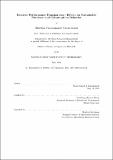| dc.contributor.advisor | Yanchong (Karen) Zheng. | en_US |
| dc.contributor.author | Mariadassou, Shwetha Paramananda | en_US |
| dc.contributor.other | Massachusetts Institute of Technology. Operations Research Center. | en_US |
| dc.date.accessioned | 2017-10-30T15:04:13Z | |
| dc.date.available | 2017-10-30T15:04:13Z | |
| dc.date.copyright | 2017 | en_US |
| dc.date.issued | 2017 | en_US |
| dc.identifier.uri | http://hdl.handle.net/1721.1/112010 | |
| dc.description | Thesis: S.M., Massachusetts Institute of Technology, Sloan School of Management, Operations Research Center, 2017. | en_US |
| dc.description | This electronic version was submitted by the student author. The certified thesis is available in the Institute Archives and Special Collections. | en_US |
| dc.description | Cataloged from student-submitted PDF version of thesis. | en_US |
| dc.description | Includes bibliographical references (pages 55-60). | en_US |
| dc.description.abstract | We build on existing operations and marketing research focusing on the effect of information transparency on consumers by studying how transparency into the levels and changes of relative sustainability performance affects consumer behavior. Our work considers two forms of transparency: process transparency and customer transparency. We operationalize process transparency, in which information about the company's sustainability performance relative to competitors is revealed to the customer, in the product purchase domain. We operationalize customer transparency, in which the customer receives information about their own sustainability performance relative to other customers, in the energy consumption domain. In a series of online consumer choice experiments, we find that within the product purchase domain, transparency into the company's current levels of sustainability performance has a more powerful effect on influencing consumer purchase behavior than transparency into the company's changes in relative sustainability performance over time. Conversely, in the energy consumption domain, we find that transparency into the customer's changes in sustainability performance over time, relative to other customers, has a more dominant effect in motivating energy conservation than transparency into the customer's relative levels of sustainability performance. We employ structural equation models to identify the underlying mechanisms that drive these results. | en_US |
| dc.description.statementofresponsibility | by Shwetha Paramananda Mariadassou. | en_US |
| dc.format.extent | 60 pages | en_US |
| dc.language.iso | eng | en_US |
| dc.publisher | Massachusetts Institute of Technology | en_US |
| dc.rights | MIT theses are protected by copyright. They may be viewed, downloaded, or printed from this source but further reproduction or distribution in any format is prohibited without written permission. | en_US |
| dc.rights.uri | http://dspace.mit.edu/handle/1721.1/7582 | en_US |
| dc.subject | Operations Research Center. | en_US |
| dc.title | Relative performance transparency : effects on sustainable purchase and consumption behavior | en_US |
| dc.type | Thesis | en_US |
| dc.description.degree | S.M. | en_US |
| dc.contributor.department | Massachusetts Institute of Technology. Operations Research Center | |
| dc.contributor.department | Sloan School of Management | |
| dc.identifier.oclc | 1006884463 | en_US |
